April 07, 2023
Bug hunting isn’t for the faint of heart; those who do it protect millions from digital threats. As a senior security engineer on the Chrome offensive security team, Brendon Tiszka spends his days making sure users stay safe while browsing the internet by scouring lines of code for flaws.

Since graduating from Mizzou Engineering seven years ago, Tiszka has worked at eBay, Facebook and Google as a cybersecurity researcher. In his current role, he has discovered bugs that would have allowed hackers to bypass browser security restrictions and plant spyware on devices.
“Every bug I find could be a bug that allows others to hack into peoples’ phones,” he said. “What I’m doing helps protect the world’s most vulnerable – human rights activists, journalists, political dissidents. If I’m being honest, I also still find it really fun. My job is like solving puzzles, and I got really lucky that it intersects with something that’s pretty important for the world.”
Tiszka has always been interested in computer security. He chose to study at the University of Missouri because of the faculty and because at the time, not many colleges offered courses in cybersecurity.
“Professor [William] Harrison in the electrical engineering and computer science department is pretty well-known in the security community,” Tiszka said. “I came to Mizzou because I wanted to study with him. In my last year he took me on as a research assistant for course credit. I think he could tell that I was really passionate about things, so he let me spend a lot of time just exploring and learning about fuzzing.”
During his time in college, Tiszka also helped start the Mizzou Computing Association (MCA) and the first Hack Mizzou with a couple of his close friends. He also spent time competing in digital Capture the Flag competitions, a game where two teams compete to hack into the other’s server while protecting their own.
“One thing I really liked about Mizzou is that it wasn’t a total grind,” he said. “I learned so much in class, but there was also enough room to breathe outside of class that I could explore really niche areas of computer science, which isn’t always the case at other universities, where you’re only focusing on the course load and are forced into a narrow career path. I attribute a lot of my success to just being able to breathe while in college and explore things on my own.”
Tiszka also credits his preparation during and after college with setting him along the right path. His classes gave him a foundation upon which to build his knowledge of cybersecurity and coding. His friends supported each other through college, and they stuck together after graduation and moved to San Francisco.
He took jobs that would develop his skills, even if they weren’t exactly what he wanted to end up doing, to progress toward finding a career looking for bugs that affect people. At eBay he looked for bugs in their backend infrastructure, and then at Facebook he was focused on bugs that harmed the company and users. His current job at Google allows him to spend all his time looking for bugs in client applications, such as Chrome.
“It was a slow journey to what I actually wanted to do, but the things I learned and the network I built in each role really helped me get here,” Tiszka said. “Don’t worry about finding the perfect job right out of college or be worried about joining the most prestigious company. I feel like that paralyzes some students. It gets a lot easier to move laterally or up once you get into the industry.”
As his career has progressed, Tiszka finds success through always improving and learning. His day-to-day successes come from achieving personal milestones.
“There’s really concrete feedback in my job to know I’m doing well, by finding more and more complex bugs,” he said. “At first, I wanted to find a bug in iOS, or a bug in Chrome. Then it was looking for 10 bugs, and the bar just kept getting higher. By starting with simple targets and going after harder targets over time, I feel more successful after I achieve each one.”
He also recommends that young people shouldn’t be intimidated to reach out to industry leaders for help or advice. In college, he would cold-email engineers in the field to ask them questions about their code base and expertise. This helped him build a professional network and learn more about cybersecurity.
“The worst thing that could happen is the person you email doesn’t respond,” he said “They won’t think ‘oh, what a dumb kid,’ they either will have too much on their plate and forget about it, or they’ll respond and be super helpful. Always asking tons of questions of people is one thing that will definitely help people find success.”
Choose Mizzou Engineering and start your journey toward your dream career today!